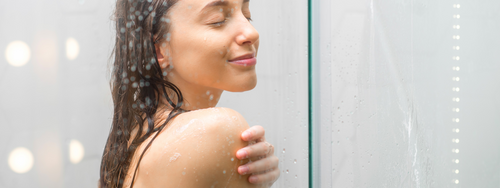Share:
Radiant, healthy skin is the result of understanding and nurturing the body's natural protective layers. Among the most critical, yet often overlooked components of skin health, are the natural oils our skin produces. Known as sebum, these oils are essential for maintaining the skin’s barrier, protecting it from environmental damage, and keeping it hydrated. In this comprehensive guide, we delve into the importance of preserving these vital oils, especially after showering, which can strip them away if not managed properly.
Understanding Natural Body Oils
Natural body oils or sebum are secreted by the sebaceous glands located throughout the skin, except on the palms and soles. These oils not only keep the skin hydrated but also form a protective barrier against external pollutants and bacteria. They are crucial in maintaining the skin's elasticity and can help in reducing the signs of aging.
The Impact of Showers on Skin Health
Showers, although essential for maintaining cleanliness, can pose a challenge to the skin's natural oil balance. The combination of hot water and soaps can strip the skin of its protective lipid layer. This section explains how you can enjoy your showers without compromising your skin’s integrity.
- Temperature Matters: Lukewarm water is best for preserving skin oils compared to hot water, which can increase oil production in the sebaceous glands, leading to potential outbreaks.
- Choosing the Right Cleansers: Non-soap cleansers or those labeled "non-comedogenic" or "for sensitive skin" can prevent the loss of natural oils while ensuring the skin remains clean.
Best Practices for Skin Care After a Shower
Adopting a few simple practices after showering can significantly enhance your skin's moisture levels and overall health:
- Pat to Preserve: Always pat your skin gently with a soft, plush towel to avoid over-exfoliation and irritation. This helps in retaining essential moisture and oils.
- Optimal Towel Fabric: Choose towels that are gentle on the skin. Materials like bamboo or cotton not only feel luxurious but are also highly effective at absorbing moisture without being harsh on the skin.
- Moisturize Immediately: Applying a moisturizer within a few minutes after drying can trap water in the surface cells of the skin, helping to replace any moisture that has been lost during showering.
Enhancing Skin Health with Additional Skincare Routines
Adding specific products to your post-shower routine can further protect and replenish your skin:
- Hydration Boosters: Incorporate products that contain hyaluronic acid or glycerin, which attract moisture to the skin and are excellent for maintaining hydration levels.
- Barrier Repair: Consider using products with ceramides post-shower to help restore the skin barrier and prevent moisture loss.
Natural Alternatives and Enhancements
Exploring natural oils can provide effective hydration without the additives found in commercial products:
- Jojoba Oil: Closely mimics the structure of human sebum, making it less likely to clog pores and effectively hydrates without a greasy feel.
- Argan Oil: High in vitamin E and essential fatty acids, it is ideal for moisturizing the skin, boosting elasticity, and giving the skin a natural boost.
Common Concerns and How to Address Them
It's essential to tailor your skincare routine to address specific skin concerns effectively:
- Dry Skin Tips: Look for oils like avocado or olive oil, which are rich in vitamins and antioxidants to nourish and heal dry skin.
- Managing Oily Skin: Lightweight oils like grapeseed or hemp oil can regulate oil production without adding extra oil to the skin.
- Sensitive Skin Solutions: Products with calming ingredients like aloe vera or chamomile can soothe the skin while maintaining its natural barrier.
Conclusion
Understanding and preserving the natural oils of your skin post-shower is a pivotal step in achieving lasting skin health and vitality. By carefully selecting products and adjusting your shower habits, you can protect these essential barriers and promote a healthy, glowing complexion.
Calls to Action
For more insights on effective skincare routines and product recommendations tailored to your unique needs, visit our extensive resources onouragami.org.
References:
- Zouboulis, C. C., & Boschnakow, A. (2001). Chronological ageing and photoageing of the human sebaceous gland. Clinics in Dermatology, 19(4), 562-567.
- Pappas, A. (2009). Epidermal surface lipids. Dermato-Endocrinology, 1(2), 72-76.
- Madison, K. C. (2003). Barrier Function of the Skin: "La Raison d'Être" of the Epidermis. Journal of Investigative Dermatology, 121(2), 231-241.
- Elias, P. M. (2007). The skin barrier as an innate immune element. Seminars in Immunopathology, 29(1), 3-14.
- Lin, T. K., Zhong, L., & Santiago, J. (2017). Anti-Inflammatory and Skin Barrier Repair Effects of Topical Application of Some Plant Oils. International Journal of Molecular Sciences, 19(1), 70.
- Vaughn, A. R., Clark, A. K., Sivamani, R. K., & Shi, V. Y. (2018). Natural Oils for Skin-Barrier Repair: Ancient Compounds Now Backed by Modern Science. American Journal of Clinical Dermatology, 19(1), 103-117.



